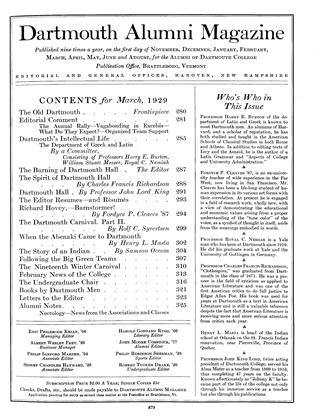If you have kept your eye on Mrs. Woolf's work, you know that her novels can always be trusted to be in the latest fictional mode. When you read her last book you are keeping up with the vogue. In 1920 she published The Voyage Out, almost straight realism; Jacob's Room, 1923, might be called impressionism; Mrs. Dalloway, 1925, and To the Lighthouse, 1927, explored the possibilities of the stream-of-consciousness method. Each of these was "advanced" for its day. But the 1928 mode in fiction seems to be, oddly enough, the fantasy. Fiction, the most advanced fiction, that is, has gone fairy tale. And so has Mrs. Woolf.
In this story a boy is born in the reign of Elizabeth, falls unluckily in love in the reign of James I, retires to his country house, goes as ambassador to Constantinople in the reign of Charles 11, becomes a woman, foregathers with gipsies in the Balkans, and then, returning to England, with the wits under Queen Anne, marries under Victoria, has a son, and ends, a woman of 36 and a successful author, in 1928. These are the events of the fairy tale, involving the expansion of experience to limits impossible except in dream or fancy.
But the 1928 model fairy tale is never simply marvels for gaping ears. It must be no artless piling up of wonderful events. It must have polish and wit and suavity, and, especially, some meaning behind the events. How does Orlando meet those requirements?
No one can deny the polish, the wit, the suavity, and the charm. From the astonishing preface to the last word there is all that and more. But the meaning? Unquestionably a significance of some sort lies under this shining surface, by which what happens is made to seem, after all, not so important. I have seen Orlando called a novelized history of English literature. If it was so meant it is sketchy in the extreme and not even perfectly accurate. That explanation of what Mrs. Woolf is about won't do for me. I believe that Mrs. Woolf, one of the most conscious writers alive today, is really writing about what makes a writer. Orlando, who, whether man or woman, ambassador or gipsy, lover or beloved, solitary or societarian, struggles always to write, and who finally achieves popular and critical success, I think is the symbol of a writer's creative spirit. Mrs. Woolf wishes to say that this spirit must live through all these experiences and learn all it can from the writers of the past, before it can really come to fruition. The writer must breathe the air of all the literary past of his country, and run up and down the scale of living, at least in imagination, before he can live himself into a book. Through his more than three centuries of life Orlando pursues Life and Literature, not to judge them, nor merely to absorb them, but to comprehend them so that he (or she) may hold them in the net of his own words.
That is my guess at what Mrs. Woolf is about. I think I can make a pretty good detailed case for my guess, for which, however, I haven't space here. There will remain, even then, many hints and devices in this book which I can't explain, which are probably fully intelligible only to Mrs. Woolf herself. But whether my guess is right or wrong any reader may decide, and be, amused in the process.
 View Full Issue
View Full Issue
More From This Issue
-
 Article
ArticleRichard Hovey,-Barnstormer!
March 1929 By Fordyce P. Cleaves '87 -
 Lettter from the Editor
Lettter from the EditorEditorial Comment
March 1929 -
 Article
ArticleThe Dartmouth Carnival
March 1929 By Rolf C. Syvertsen -
 Class Notes
Class NotesCLASS OF 1927
March 1929 By Doane Arnold -
 Class Notes
Class NotesCLASS OF 1914
March 1929 By John R. Burleigh -
 Article
ArticleThe Story of an Indian
March 1929 By Samson Occom












